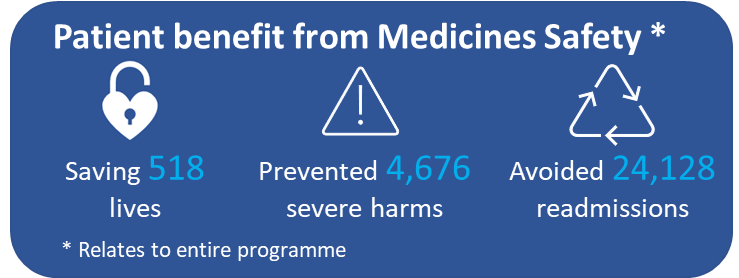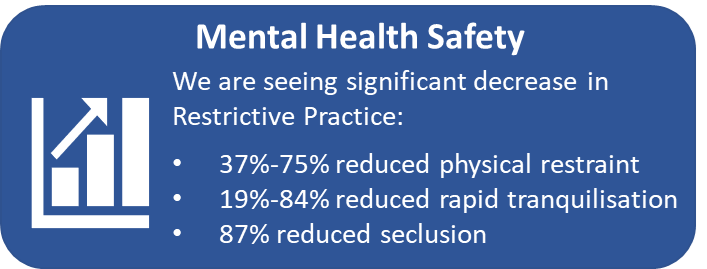The Health Innovation Network supports the delivery of the National Patient Safety Improvement Programme through its 15 regional Patient Safety Collaboratives (PSCs). The programme supports the NHS England Patient Safety Strategy. During the first quarter of 2023/24 (April to June 2023) significant progress has been made across all five improvement workstreams. See the highlights below or download the report.
Managing deterioration in care homes
PSCs are working with care homes to support staff in identifying the physical and early soft signs of health deterioration in adult residents, communicating concerns to multi-disciplinary teams, and taking early action when needed. Adopting a deterioration management tool, such as RESTORE2, is key to supporting staff and PSCs have supported care homes in adopting this improved way of working.
Impact: PSCs are now working with 11,827 care homes across England. As a result of working with PSCs 79% of care homes have received deterioration management tool training and 64% (9,530) of care homes have adopted a deterioration management tool. Four PSC localities have particularly high adoption levels of over 85%. The programme has now entered a period of pause.

Find out more about how PSCs are supporting safety improvements in care homes.
Maternity and Neonatal safety
Improving the safety and outcomes for mothers and pre-term babies is at the core of PSC support to maternity and neonatal units.
Impact: Improving the care of premature babies has saved up to 584 lives and prevented up to 385 cases of cerebral palsy.

Find out more about the work Health Innovation Networks are doing to improve maternity and neonatal safety.
Medicines safety
Opioids are highly effective in supporting patients in managing pain, but can do more harm than good when used long-term for non-cancer pain. PSCs are working with 42 integrated care boards (ICBs) and are actively supporting 24 of these to implement a whole system approach to reducing opioid prescribing for non-cancer related chronic pain. This work brings the science of continuous safety improvement to safety culture, safety systems and high-risk medicines in common use.
Impact: There has been a reduction in the number of people being prescribed transdermal opioids in four or more consecutive months this equates to 518 lives being saved, and the prevention of 4,676 severe harms and 24,128 hospital readmissions avoided.

Find out more about the work Health Innovation Networks are doing to improve medicines safety.
Mental Health
Restrictive practices such as physical restraint, seclusion, and rapid tranquilisation, can cause physical and mental harm to patients and staff. PSCs are supporting mental health services to reduce the use of restrictive interventions in mental health settings.
Impact: At the end of 2023, 98% of all eligible NHS mental health, learning disabilities and autism (MHLDA) Trusts were involved with the programme, either supported directly by PSCs or involved through the mental health patient safety networks. 261 wards across England were actively engaged in the reducing restrictive practice work, including wards across NHS MHLDA Trusts and all of the major private providers of NHS-funded mental health inpatient services.
We are seeing significant decreases in restrictive practice with between 37-75% reduction in physical restraint, between 19-84% reduction in rapid tranquilisation, and up to 87% reduction in seclusion in some organsiations.

Find out more about the work Health Innovation Networks are doing to reduce restrictive practice in mental health services.
Systems safety
PSCs continue their contribution to the implementation of the Patient Safety Incident Response Framework (PSIRF). PSCs have engaged with systems, particularly Integrated Care Boards (ICBs), to define their support for PSIRF implementation in the stipulated phases.
Impact: PSCs are engaged with all stakeholders supporting them to implement PSIRF across the system.

Find out more about the work Health Innovation Networks are doing support system safety improvements.
Read more about how patient safety collaboratives are progressing National Patient Safety Improvement Programme work here in the latest activity report.

There is a wealth of HealthTech innovators poised to help solve some of the NHS’ greatest challenges, yet getting a product or new technology adopted at scale in the NHS is far from straightforward. In a recent ABHI member’s survey*, procurement was cited as one of the biggest barriers that innovators face, particularly those from [...]

Tellmi is a social enterprise innovation which aims to address the growing demand for mental health services and tackle health inequalities for young people. It is a digital peer support app available launched in 2017 by psychologist Suzi Godson PhD and engineer Kerstyn Comley PhD. Kersytn explains how Tellmi works. Tell us about the innovation. [...]

The NHS is facing record demand for services. According to The Health Foundation, the NHS waiting list for elective treatment in England has almost tripled in size over the last decade to 7.7 million. And latest figures show there were a record 2.35 million attendances at A&E across England in March this year. We know [...]






